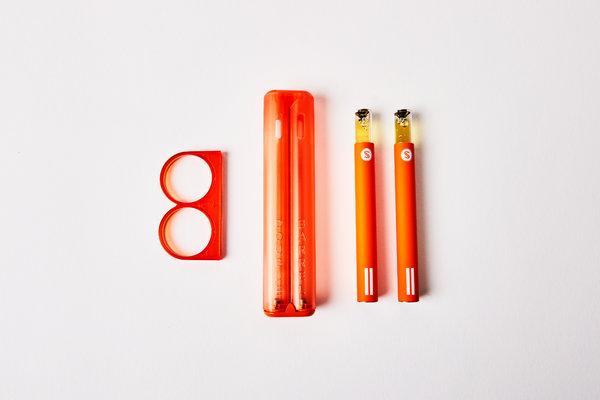To his die-hard fans, Mr. Sherbinski is a storied name in marijuana.
A celebrated California cultivator, he helped create the Gelato and Sunset Sherbert strains that have been name-checked in more than 200 hip-hop songs, including “First Off” by Future and “Bosses Don’t Speak” by Migos.
At the Business of Fashion’s Voices conference in London last year, his brand, Sherbinskis, was introduced as “the Supreme of marijuana.”
And when Sherbinskis released its first sneaker design last year at ComplexCon, a two-day festival of hip-hop and fashion in Long Beach, Calif., the limited-edition Nike Air Force 1 model sold out in two hours. (There is a pair currently on eBay asking more than $1,000.)
Now, devotees of the marijuana brand will have an official place to worship.
Sherbinskis recently announced plans for its first store, on Fairfax Avenue in Los Angeles, a few doors away from a Supreme boutique.
Renderings show a rooftop garden that is visible from the sidewalk (no, there won’t be pot plants growing there), and a gallery-like white space decorated with close-up photos of marijuana buds. Haute cannabis products for sale include vape pens and pre-rolled buds in Instagram-worthy orange packaging; branded hoodies, fanny packs and Mophies; and fashion collaborations.

Sherbinskis cannabis oil cartridges with a Double Barrel vaporizer.CreditSherbinskis
“I want to evolve past the taboo, what I call the ‘dirty bong’ syndrome,’” said Mario Guzman, the Sherbinskis founder who for years was known only by his street name, Mr. Sherbinski.
With his deep roots in cannabis, Mr. Guzman, 42, is hardly another corporate newcomer looking to hitch a ride on the legal-marijuana express. For decades he has been building a reputation as a cultivator and innovator of widely copied strains. Now he plans to grow Sherbinskis into a lifestyle brand beyond stoners.
“When people think of Supreme, a lot of people don’t know it was started as a skate shop,” Mr. Guzman said. “It was really made by skaters, but Supreme got to the point where people that never ride a skateboard buy their stuff, because it’s fire.”
This is not to say that Mr. Guzman has any plans to abandon cannabis. After two decades, he qualifies as a lifer, although a career in pot was never his goal.
The son of a Mexican immigrant who was a sheriff’s officer in Sacramento, Mr. Guzman moved to San Francisco in the mid-1990s and was making good money as a real estate broker until the dot-com bust. Because medical marijuana was legal in California, a friend suggested he make ends meet by growing marijuana in the garage of his Sunset District house.
He eventually collaborated with the developers of a popular marijuana strain called Girl Scout Cookies to create the Sunset Sherbert and Gelato lines, and soon spun off on his own to perfect those strains. The Gelato strain is a indica-sativa hybrid with purplish buds that delivers a “heavy handed euphoria,” according to its promotional literature. Sunset Sherbert is an indica-leaning hybrid with a flavor suggesting fruit and berries that brings a stress-melting body high.
The confectionary names seemed inevitable, he said, given that “the munchies is obviously something that’s associated with smoking cannabis.”
Mr. Guzman’s creations soon spread among Bay Area rappers like E-40 and B-Legit, and, eventually, to Los Angeles artists like B-Real, the Cypress Hill rapper of “Insane in the Membrane” fame.
“They were the ones calling us,” he said. “They wanted us to be there, to smoke with them, to vibe with them on a creative level.”
While Mr. Guzman takes pride in his street cred, he has no qualms about the corporate fervor that is transforming the industry.
“The people that are running these $500 million hedge funds, they have smart people and big checkbooks, but I still feel like there’s a shortage of people who are passionate and have been doing this a long time,” Mr. Guzman said. “I know my value.”
Part of his value lies in more than a million square feet of greenhouse space in Santa Barbara, a 22,000-square-foot indoor facility in Sacramento, a four-acre property with commercial greenhouses in Mendocino and other growing operations.
“I know I can always make a living,” he said. “I can always have a garden.”







